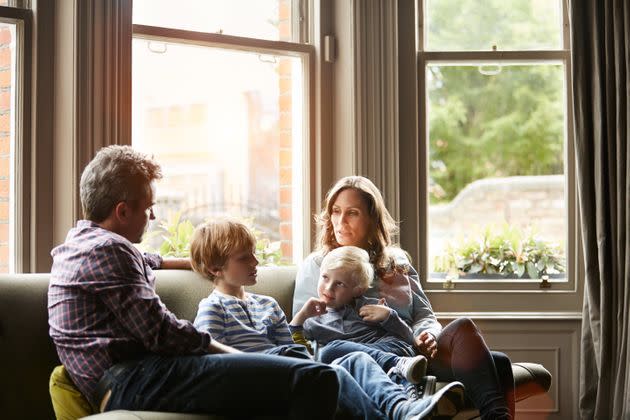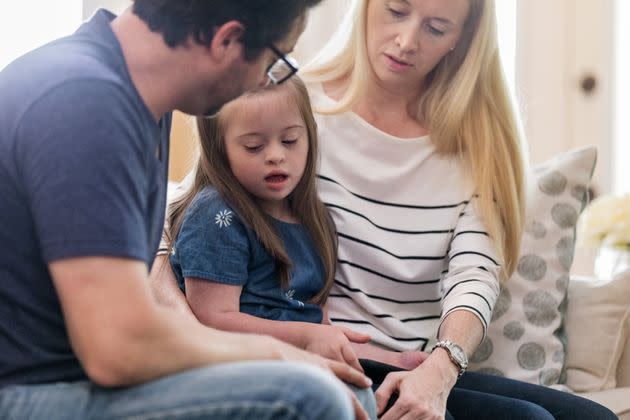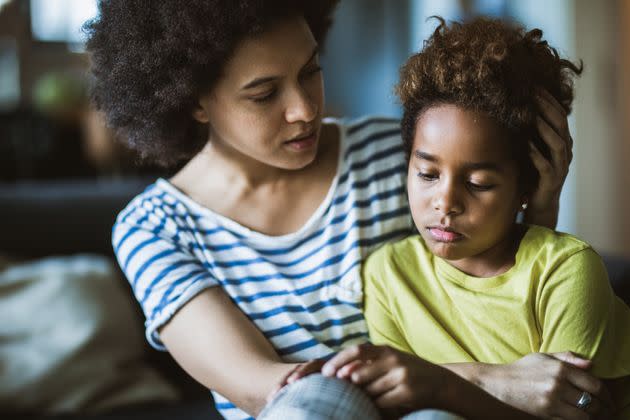How To Talk To Your Kids About Divorce

Divorce can feel like an overwhelming topic to address with kids, so it's important to prepare for the conversation. (Photo: kupicoo via Getty Images)
When couples get married and have children, they generally don’t do so with the expectation that they’ll get divorced. But statistically, divorce is a possibility, and it doesn’t have to be a bad thing.
“For many couples, separation or divorce is the best thing they can do for each other ― and for their children,” said Elena Krasnoperova, creator of the co-parenting app WeParent, which helps divorced and separated parents manage custody schedules. “Witnessing constant fighting in high-conflict marriages is more damaging to the kids’ well-being than an amicable divorce where both partners commit to being the best co-parents that they can be.”
If you’ve decided to split up, how exactly should you go about sharing the news with your children? Below, Krasnoperova and other experts share their advice for talking to kids about divorce.
Be mindful of timing.
“Don’t tell the children until you’ve reached a definite decision to separate and that separation will be happening soon. Kids don’t need to be dragged through the uncertainty and back-and-forth,” said Eileen Kennedy-Moore, a psychologist and author of “Kid Confidence: Help Your Child Make Friends, Build Resilience, and Develop Real Self-Esteem.”
You and your spouse should get on the same page before telling your children. Kids will also need transition time to take in the information, process it, ask questions and gradually shift into a different way of existing as a family. Don’t share the news and have one parent pack their bags and leave the next day.
“I tell parents to think of it like any other transition they’d approach,” said Christina McGhee, a divorce coach and author of “Parenting Apart: How Separated and Divorced Parents Can Raise Happy and Secure Kids.”
“If your kids were changing schools, you wouldn’t just drop them off at the new school one day,” she continued. “You might talk about it, visit, do a dry run, talk about what the first day would look like. You can approach divorce the same way.”
She advised giving kids at least a week or two to process the news, and perhaps telling them on a Friday after school or Saturday morning so that they have the weekend at home as a family to absorb it and ask initial questions. Don’t present the information at bedtime or right before dropping them off somewhere. And remember, it’s not a one-and-done conversation; it’s a series of discussions that will happen over time.
Prepare and present a united front.
Put together a plan for what you’ll say to your children, set up talking points, and be present as a pair for the conversation.
“Try to set everything complex and messy aside to come together as a parenting team to share this news with calm confidence,” said Julianne Neely, a child therapist and executive director of Individual and Family Connection. “Let this set a positive tone for your future co-parenting relationship. Agree ahead of time on a clear, consistent narrative using common language you are both comfortable with.”
Even if things are contentious, put aside blame and emphasize that this is a joint decision. Try not to focus on who did something wrong, who had an affair, who decided to move out, etc.
“Use the word ‘we’ ― ‘We have decided. We have been arguing too much. We don’t want to be married anymore. We’re going to live in two separate houses,’” advised psychologist, play therapist and “Mommy Burnout” author Sheryl Ziegler.
Make sure logistics are organized so that you can tell kids who will be living where, timelines for moving, schedules for seeing each parent, school pick-up routines and other information. Be prepared for a variety of responses from your children, whether it’s silence, despair, anger, attempts at bargaining, or even nonchalance. They will likely cycle through different emotions over time.
Keep it simple with little kids.
“The first conversation should be with all the kids together, older and younger,” said Ann Buscho, a psychologist and author of “The Parent’s Guide to Birdnesting: A Child-Centered Solution to Co-Parenting During Separation or Divorce.”
You can limit that initial group conversation to the basics and then follow up with individual discussions tailored to each child’s developmental level.

Small children need reassurance that they had nothing to do with this separation and that their parents will always love them. (Photo: JohnnyGreig via Getty Images)
“Toddlers don’t need a lot of information other than that Mommy and Daddy will have two homes now, and that they will always love them,” Buscho noted. “They may have questions but maybe not. It is important to reassure them that they didn’t cause the divorce, nor can they fix it.”
When speaking to little children, remember that they don’t fully understand complex events and emotions, so use clear, simple language and try not to give too much information.
“Toddlers and preschoolers are literal,” Neely said. “Don’t try to soften the news with unclear words, half-truths or metaphors. Use real words to talk about the actual things, like ‘divorce.’”
Stevie Puckett-Perez, a pediatric psychologist at Children’s Health in Dallas, offered a script for explaining divorce in the context of a heterosexual marriage: “Daddy and I are getting something called a divorce. That means that instead of being married and living in one house, we will be friends instead, and Mommy will live in one house and Daddy will live in another house. You will get to have two houses and spend time with both of us. I will always still be your mommy, and Daddy will always be your daddy, and we will always love you and take care of you.”
Give older kids more information, but with boundaries.
The older the child you’re dealing with, the more questions they might have, as they’re developing their ability to process feelings and becoming aware of the world around them. Continue to be clear with concrete and age-appropriate information.
“Ask if they have any friends with divorced parents and what that’s like,” Kennedy-Moore suggested. “Explain how your situation is similar or different to the friend’s.”
You should still emphasize that the children are not to blame and that you will always love them and be their parents. Explain that two good people don’t always make a good couple, and that you’ll both be happier living apart. Address what will change and what will stay the same.
Preteens and teens may want more information or to be involved in some way, so it’s crucial for you and your spouse to decide what you feel comfortable sharing to help them process and heal.
“There’s no need to explain why, especially if there has been a betrayal,” Buscho said. “Best to say, ‘We have tried but we aren’t happy living together.’ No blame on one parent even if one parent doesn’t want the divorce. Kids don’t understand adult relationships and definitely don’t understand marriage, so be careful not to share adult information (affairs, sexual issues, etc.).”
Don’t make kids think they have to pick a side.
“Explain that your child does not have to and should not pick sides,” Kennedy-Moore said, noting that kids often end up feeling caught in the middle.
You can emphasize that just because you have issues with the other parent sometimes, that doesn’t mean the child should too. The marriage is over, but the family continues.
“No matter how you feel about your ex-spouse, try your best to put your kids’ interests first,” said Krasnoperova. “In most situations, except extreme situations like domestic violence, severe addiction, or severe mental illness, kids benefit from having both parents remain part of their life.”
Conflicts with your ex may arise, but the goal is to foster positive relationships between your children and both of their parents.
“If you’re in a situation with a co-parent who’s saying things to the kids that you don’t feel are true, you don’t have to contradict them but can let kids know that that’s not the way you see it,” McGhee explained. “If Mom said, ‘It’s all Dad’s fault, he’s the one that left,’ then the dad can say something like, ‘It sounds like Mom is feeling really angry, and people may say mean things when they’re mad. I don’t agree with what she said. I see it a different way.’”

Parents should try not to complicate their child's relationship with the other parent. (Photo: SDI Productions via Getty Images)
In addition to explicitly stating that there’s no need to blame or feel negatively about your former spouse, you should lead by example.
“Try to minimize kids’ exposure to arguments and bickering,” said Ziegler, who advised demonstrating amicable interactions with small talk or holiday wishes. She also recommended sitting near each other at soccer games or school concerts so that your children don’t feel like they have to decide which parent to greet first.
“Speak positively about one another,” Neely said. “Children’s relationships with their parents powerfully shape their sense of self and their overall growth and development. As hard as it may be at times, you want your child to have a healthy relationship with both of you.”
Try to set aside your bad feelings about your ex in order to model healthy behavior for your children and learn to effectively co-parent. In those moments when you want to say something critical about your ex or express negative emotions, don’t do it in front of your children, no matter how close you are. Instead, save such conversations for a friend, therapist or other trusted adult in your life.
Focus on stability.
Divorce brings a lot of change, but predictability and structure can help children deal with the transition. Stability is especially important for little kids. Maintain the same activities, expectations for chores and frequency of friends coming over. Try to stick to a schedule for time spent with each parent.
“The rules don’t have to be exactly the same between two households, but you and your ex should establish generally consistent guidelines,” said Reena B. Patel, a licensed educational psychologist and author of “Winnie & Her Worries.” “For example, mealtime, bedtime and completing homework need to be consistent. This helps create a sense of belonging and creates a sense of security and predictability for children.”
Kids need to feel like they are safe and belong at both homes. You might display family photos at both residences and keep a calendar visible with everyone’s schedules all mapped out.
“Center your narrative on what will not change ― that they will continue to be loved, safe and cared for,” Neely said. “If your child is feeling loved and valued throughout this process, that will serve as a protective buffer from the stress of divorce.”
Offer frequent reassurance.
“Reassurance is the most important thing,” Buscho said. “Emphasize that it is sad and hard and no one wants this, and all feelings are normal, but, ‘We will all be OK.’”
Use physical displays of affection and reassurance like hugs and cuddles. Repeat that they have nothing to do with the divorce, and it is not their fault; sometimes romantic relationships just change over time, and although parents can fall out of love with each other, they never fall out of love with their children.
“This is a grown-up decision and you’re still a family, but you’re just going to be a different kind of family,” said psychotherapist Kathryn Smerling.
Try to keep your emotions in check in their presence as much as you can. If your kids worry about your well-being, assure them that it’s not their responsibility to comfort and take care of you. Lots of other grown-ups are there for you.

The divorce talk is a series of conversations throughout the complex emotional and logistical process of separation. (Photo: skynesher via Getty Images)
“After these conversations have occurred and the process of divorce is in the works, encourage kids to also consider the benefits of their parents divorcing,” Puckett-Perez said. “Is there anything good about it? From concrete things like now you have two houses, you get to celebrate your birthdays, holidays and such twice, to more abstract things like now Mom and Dad can each focus on spending quality time with them, without being distracted by other stresses or arguing.”
Utilize your resources.
There are many books and videos that help explain divorce to children of all ages. Parents can use these as aids to help their kids understand and process their feelings. McGhee recommended the film “Split,” which features reflections from children whose parents have gotten divorced and the emotions that accompany the experience.
Playtime can also offer the chance to explain divorce in developmentally appropriate ways with stick figures, puppets or art.
“If you have a child with developmental differences, consider using visual cues like pictures to support the conversation,” Neely said. “Use social stories to outline what will stay the same and what will change. Prepare them well in advance for any changes to their routine, supporting the transition with a weekly calendar complete with images of which parent they will be with on which day.”
You might also want to look to your support networks and arrange time for your kids to speak to family members or other trusted adults. Keep an eye out for irregular behaviors like extra attachment or changes in eating or sleeping patterns.
“You can also offer your kids other support if they need it ― like a therapist who specializes in child development ― and make sure their support system outside of the family, like teachers and coaches, are also aware of what’s going on,” said Smerling.
Answer their questions.
As always, remind your children that they can always ask any questions. Be honest in your responses and address their fears.
“Answer their questions to the best of your ability,” Krasnoperova said. “If you haven’t figured some details yet, tell them that you will let them know the answers when you have them.”
Check in and ask how they’re feeling or if there’s anything they want to know. Sometimes, they may just need you to listen and validate their feelings.
“Adults also have a tendency to overcompensate, so make sure you’re not talking too much and give the kids time to let the news sink in,” Smerling said.
Divorce is a big change that takes time to process, but there is light at the end of the tunnel.
“Express confidence that although this is a difficult or upsetting change for your child, your child will be OK,” Kennedy-Moore said. “Treat the divorce as a challenging transition, not a devastating trauma for your child.”
We’ve all been there: Somehow, you’ve found yourself in a conversation with a person you have nothing in common with, someone who intimidates you or someone who won’t stop complaining. These kinds of interactions can be uncomfortable, to say the least. Our HuffPost series How to Talk to Just About Anyone will help you navigate these conversations and others. Go here for all the latest.
Also on HuffPost
This article originally appeared on HuffPost and has been updated.

 Yahoo Finance
Yahoo Finance 